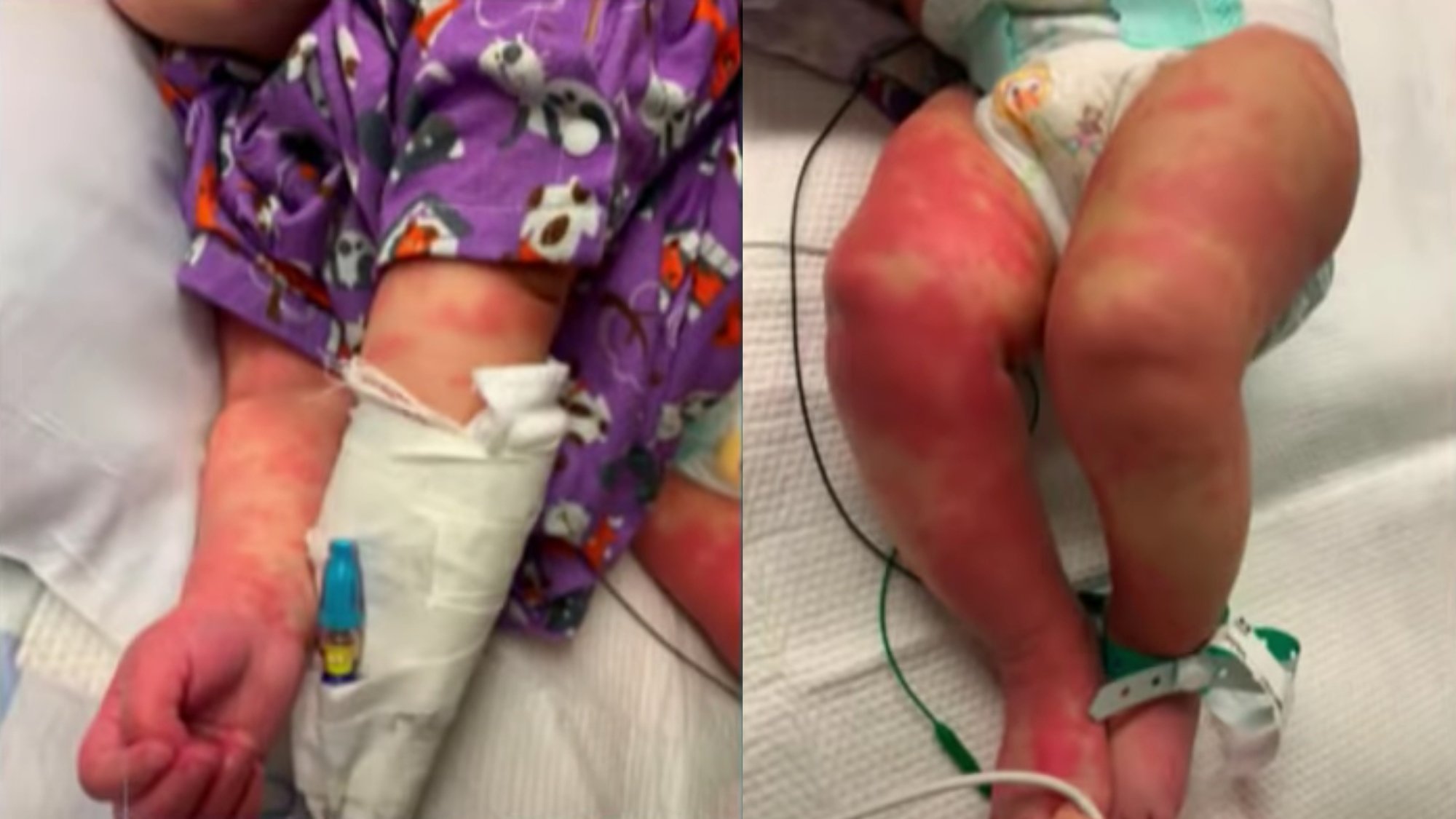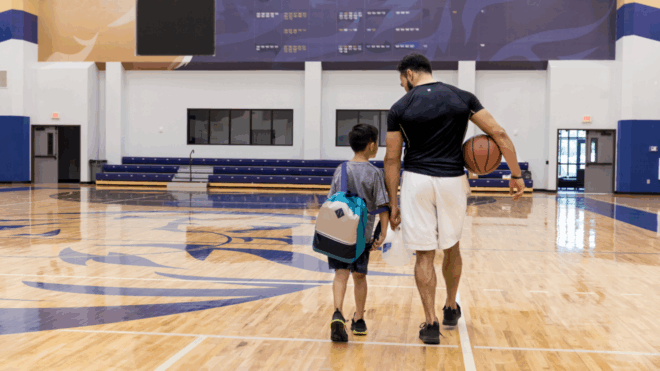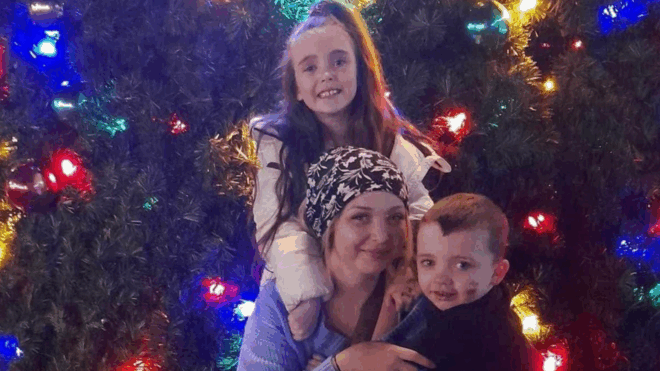
Last week, doctors in the UK began alerting health officials worldwide to an "inflammatory-like disease" that was suddenly emerging in children and believed to be triggered by the coronavirus, according to CNN. An "unprecedented cluster" of eight children were found to have a condition closely resembling Kawasaki disease, a severe inflammatory syndrome. Within days, it was clear that the cluster wasn't an isolated case, as the New York State Department of Health reported dozens more cases of a similar syndrome. Now, officials in California have confirmed that a 6-month-old baby named Zara was likely the first child in the US to present signs of Kawasaki and test positive for COVID-19 — back in March.
The child, whose last name has been withheld, was actually about to be released from the hospital when she tested positive for the coronavirus March 16.
Zara had been undergoing treatment for the inflammatory condition at Lucile Packard Children's Hospital in Palo Alto when her test results for COVID-19 came back.
In many ways, that explained a lot of what the infant had been battling for days, to no avail.
According to her mother, Mahera, Zara had experienced intense rashes, swelling, red eyes, and a dangerously high fever.
When she was first admitted to the hospital, doctors believed she would recover in five days — but that didn't seem to be happening.
"Her fever was still there, even though we were giving her Tylenol and the rashes were also getting very big and her hands and legs started kind of swelling," Mahera told ABC News.
When she tested positive for the coronavirus in mid-March, doctors were taken aback.
"There was an element of surprise and we had to put our heads together with a safe plan to send her home," Dr. Veena Jones, a pediatric hospitalist at Lucille Packard, told the San Francisco Chronicle. "We had not been expecting this."
It was, after all, in the early days of the coronavirus, when US doctors were still grappling with the scope of the condition. Few children had contracted the virus at the time, and none had reportedly tested positive while also battling an inflammatory condition.
"Once they gave us the medicine to treat it, everything was turning out very good," her mom told ABC News, adding "we feel like she's out of danger."
Now, some two months later, there certainly seems to be a strong connection between the inflammatory condition and the coronavirus.
The symptoms of Kawasaki are often debilitating and sometimes even fatal.
"Doctors aren't positive if they really are linked to coronavirus or if it's some type of association that it's having just because of the time, or if its something specific happening to children," Dr. Alok Patel told ABC News.
But as we learn more, he tells parents to "not freak out, but just to be on the lookout for any of these symptoms."
The syndrome, which typically affects children younger than 5, inflames the blood vessels and sometimes leads to heart failure.
In fact, that's precisely what happened in the case of 12-year-old Juliet Day of Louisiana, who reportedly "died for two minutes" when her heart stopped last month.
As her mother, Jennifer Daly, later told the Daily Mail, her daughter was healthy and active before she suddenly fell ill in April. Over the course of four days, her health declined so quickly that she was admitted to intensive care unit and placed on a ventilator. She too tested positive for COVID-19, while simultaneously fighting off a Kawasaki-like infection.
But remarkably, Juliet was revived by doctors, who immediately intervened when she went into cardiac arrest.
"They had to do two minutes of CPR on her," her mother recalled. "At that point, my whole world just crumbled."
Juliet is back home and reportedly doing well. So is baby Zara, who has since recovered from her traumatic hospital stay.
Their stories are drawing wider attention within the medical community, after an urgent medical warning issued last week by British doctors called for parents and physicians to be on the lookout for similar cases.
To date, New York state alone has reported 100 similar pediatric cases, which further suggest that COVID-19 and Kawasaki could be linked.
"I understand why parents would be anxious … I think everybody should be," New York Gov. Andrew Cuomo told reporters.
The particular condition, when it presents with COVID-19, is being referred to as pediatric multi-system inflammatory syndrome.
Its symptoms include fever, red eyes, a rash, an upset stomach, and, in some cases such as Juliet Day's, it can lead to cardiac arrest.
In an investigative report on the condition, Dr. Jane Newburger of Boston Children's Hospital told NBC News that she's never seen anything like it before.
"I think the global community is really concerned because this is a brand new event," Newburger said.
So far, the puzzling condition has led to more than 90 pediatric cases and five deaths in New York State.
Many of them have emerged in New York City, the nation's epicenter for the coronavirus, where Mayor Bill de Blasio said on Tuesday that 52 cases of pediatric multi-system inflammatory syndrome have been confirmed. Of these 52 cases, 25 of the children tested positive for COVID-19 and 22 were found to have antibodies, meaning they had been infected unknowingly in the past.
As a result, de Blasio urged parents to continue following social distancing guidelines and watch for signs and symptoms in their children. On Monday's daily briefing, NYC health official Oxiris Barbot attempted to more clearly define what those signs were.
"If [your child has] a fever, their energy level is off, their appetite is off, they're developing a rash, their lips look extra red, their tongue is looking extra red, those are the early signs that we want parents not to discount them and say 'oh they'll be better tomorrow' but to reach out to your pediatrician, have that conversation and then do the testing if your pediatrician thinks its indicated," Barbot told parents.
In the meantime, the New York State Department of Health is reportedly working in partnership with the Centers for Disease Control and Prevention on developing national criteria to help doctors identify, track, and respond children exhibiting symptoms, New York's governor said this week. This is expected to be especially helpful considering that many children are not exhibiting symptoms of the inflammatory syndrome for many weeks after contracting the virus.




